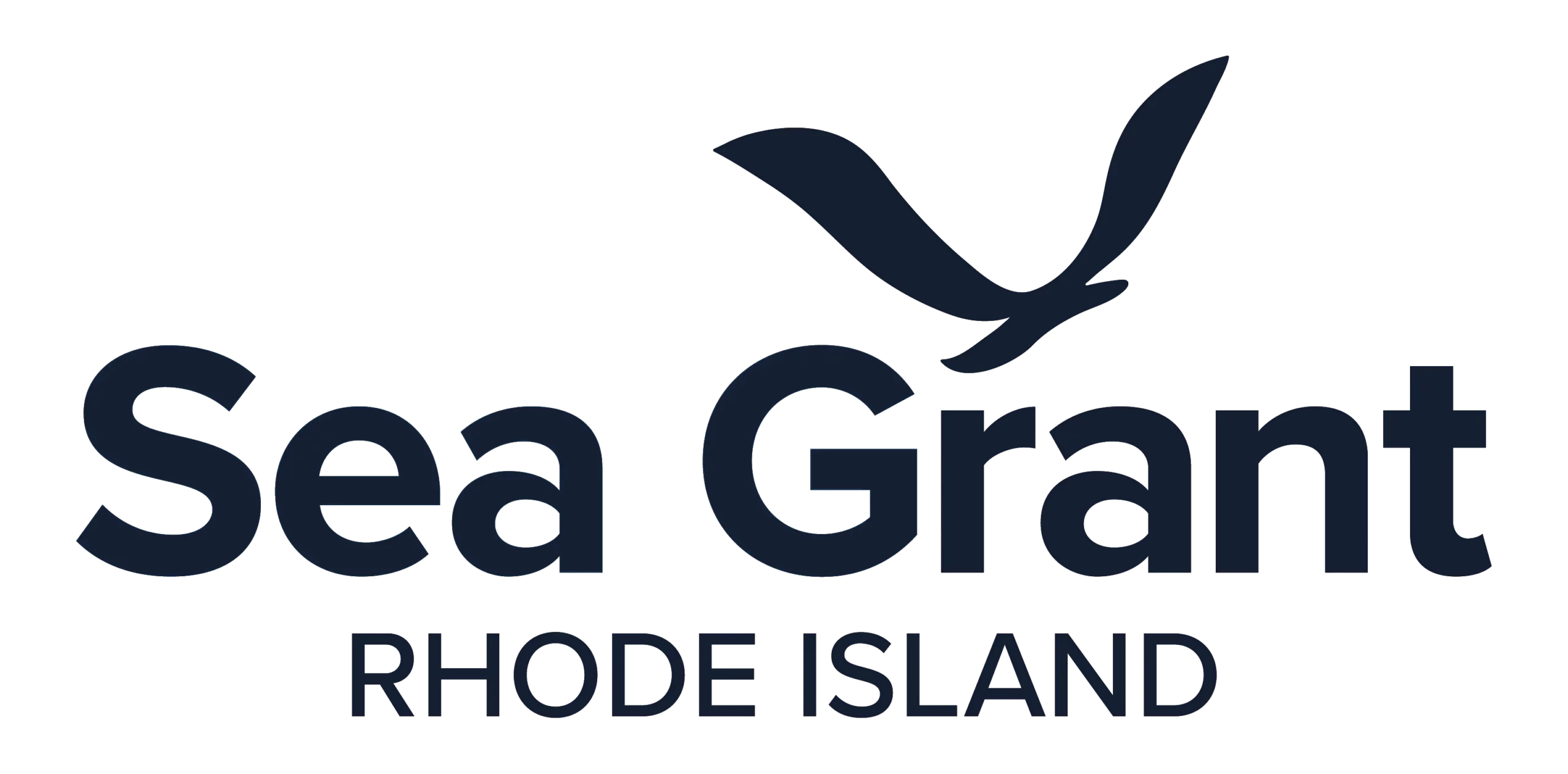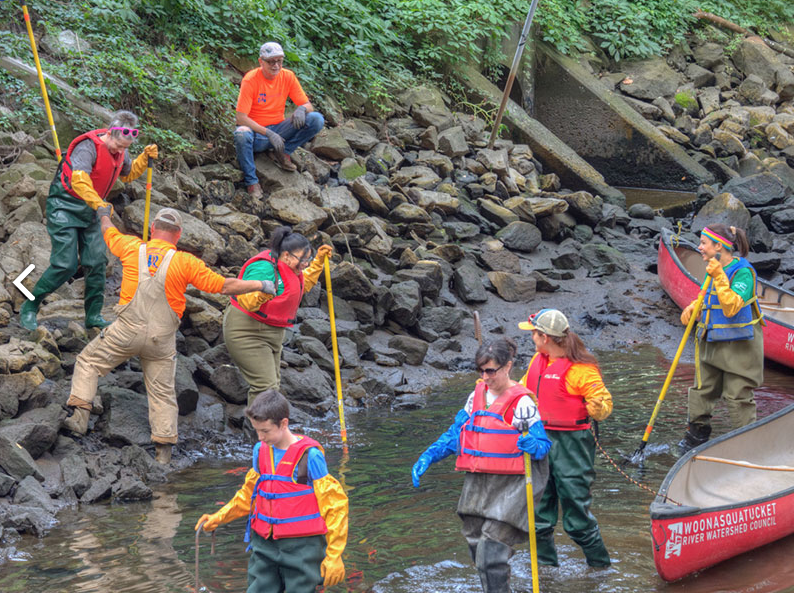The third lecture in URI Honors Colloquium addressed importance of community in building climate resilience
Allison Shinskey| Sea Grant Communications Intern
The term “climate anxiety” has become part of the lexicon to describe the growing concerns about climate change––from increased flooding to more intense storms and droughts––that can leave people feeling powerless. To address this, panelists at the third lecture of the University of Rhode Island’s Honors Colloquium discussed how collective problem-solving at the community level can help empower individuals and lead to real solutions.
“Climate change is this massive, massive issue, and it is going to take international solutions to address it,” said panel moderator Megan Hall, host for The Public’s Radio podcast Possibly. “Luckily, being resilient in the face of climate change and preparing for it is within our reach, and in fact, it has to happen on the local level.”
Preparing his community to be resilient to climate change is one project that Elder Gonzalez Trejo, community programs director at the Woonasquatucket River Watershed Council, is working on now. However, he says that some communities, like his, are not always heard, due to economic disparities.
“This needs to be a universal movement, not an elitist movement,” he said.
Trejo immigrated from Guatemala as a child and grew up in the Olneyville neighborhood in Providence. He now works with a cohort of about 20 Hispanic women from that neighborhood to solve climate-related issues by facilitating educational programs about the challenges and impacts of climate change such as increased storm intensity, examples of sustainable solutions, and what they can do about it as a community.
“Oftentimes, we think that community engagement and community activation look the same throughout all different communities, but a large part of my profession is to assess the community need, whether it’s programming, recreational opportunities, educational opportunities, or human development and leadership development trainings,” he said.
Trejo and his watershed council have made it a point to make their programs as accessible as possible for the Olneyville community by providing childcare and translators so that no participant is left behind.

Additional initiatives include education about green infrastructure with field trips to bioretention areas and rain gardens. Members of the community have also been surveyed to better understand specific concerns around climate change.
“I think the best part of this exercise was that our cohort members had the opportunity to see that the residents, their neighbors, have the exact same concerns,” said Trejo.
However, communities like Olneyville can’t solve these issues alone since cities that are upstream are making decisions that affect the community in ways they can’t always control.

Julie Wormser, Deputy Director of the Mystic River Watershed Association in Massachusetts, is looking at climate change solutions on a regional scale. The mouth of the Mystic River is near the Boston Harbor and the watershed covers 600,000 residents in 21 different municipalities. Massachusetts no longer has official counties to break up its regions, meaning that getting all of these separate communities along the river to work together on preventing it from flooding is a massive challenge.
“The water doesn’t think about municipal boundaries as we do,” said Wormser.
Experts are estimating that by 2070, the river will have catastrophically flooded multiple times due to increasingly intense storms, affecting important global manufacturing and trade facilities in Boston Harbor, according to Wormser.
In 2018, Wormser and the director of the association set out to the different communities along the river to ask opinion leaders how a regional watershed association could help them bring about solutions.
They learned that most of the communities had enough help with planning and training volunteers but wanted to take more real actions to make their communities safer while also protecting the river. They also wanted to facilitate better communication between all of the towns and communities.
Mystic River Watershed Association received a grant four years ago from the Bar Foundation to do exactly that, and they now have staff who exclusively work to help the different communities solve environmental issues related to the river. Several projects have already been completed, such as cleaning up Boston Harbor, and the association is now taking on a $500 million project to create a living shoreline along the river and build several seawalls in strategic areas to prevent flooding.
Like Trejo, Wormser is also focused on helping vulnerable populations with these projects. She has used simulations of superstorms to analyze the impacts on these communities in particular.
“Folks who are low or no income, spoke a different language than English, might not be documented, and had other barriers, such as poor health–these are the people who do worst during extreme weather,” she said.
Pam Rubinoff, a climate adaptation specialist at Rhode Island Sea Grant and the Coastal Resources Center at URI, also noted the use of simulations to identify vulnerable communities across Rhode Island.
“One of the first things that we need to know as a community, as citizens, is, what is our risk?” she said.
STORMTOOLS, an online mapping tool developed by URI for the Coastal Resources Management Council, allows Rhode Island
planners and stakeholders to view the impacts of various flooding/storm scenarios against different sea level rise projections.
“But it’s not only the scientists here at URI who are developing some of the science, it’s also citizens, citizen science,” said Rubinoff.
STORMTOOLS was created through a statewide effort to develop the Rhode Island Shoreline Change Special Area Management Plan (Beach SAMP). This plan collected data about the shoreline to develop science-backed policies and planning tools to improve the state’s resilience.
“A lot of science was put together with a lot of engagement by different stakeholders around the state,” said Rubinoff. “You really need to build the capacity of different kinds of people.”
Anxiety or concern over the rapidly changing environment may feel like an individual’s problem, but as Trejo mentioned, no one is alone in that feeling. Panelists agree that to move forward effectively will require engaging every group in a community, from board members and businesses to university students and residents, to find meaningful solutions to these issues.
Sustaining Our Shores
The University of Rhode Island Fall 2021 Honors Colloquium, Sustaining Our Shores, is coordinated by J.P. Walsh, director of the URI Coastal Resources Center, and Andrew Davies, URI associate professor of biological sciences. Rhode Island Sea Grant Extension staff have participated in the planning of this colloquium.


